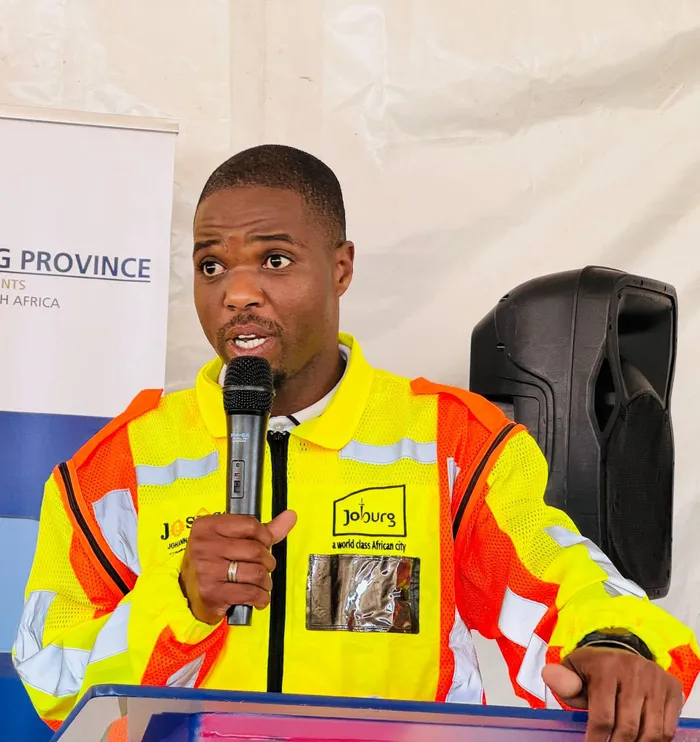Joburg MMC's stance on informal settlements sparks immigration debate
SERVICE DELIVERY

Mlungisi Mabaso's recent comments highlight a growing tension over informal settlements occupied mainly by foreign nationals, reflecting deeper issues surrounding immigration and service delivery in South Africa.
Image: Facebook
Mlungisi Mabaso, the Johannesburg MMC for Human Settlements from the IFP, recently announced that his department will not use South African taxpayers' money to service informal settlements primarily occupied by foreign nationals.
This decision has been characterised by a political analyst as a "vote of no confidence" in the government.
Mabaso stated in a viral video that his department will not use taxpayer money to service informal settlements with over 10 000 foreign nationals, adding that services might be provided only after he leaves office.
“If it’s more than 10 000 foreign nationals, we take the money of South African taxpayers and go to service foreign nationals in informal settlements - I said that is not going to happen.
“That will happen while there’s another MMC, because I will also not stay in these positions forever. I will be removed one day, and that’s when they will get the services - but not while I am still the MMC.”
Political analyst Kenneth Mokgatlhe described Mabaso’s remarks as a clear “vote of no confidence” in the government, highlighting its failure to manage rising levels of illegal immigration in South Africa. He noted that the increasing number of undocumented foreigners not only presents a security concern but also places additional strain on services intended for citizens.
“The growing number of illegal or undocumented foreigners not only poses a security threat, but it also overburdens the service delivery meant for citizens.” He said.
Mokgatlhe added that debates around undocumented immigration are a global challenge, with countries like the UK and Israel also struggling to manage it effectively. He warned that such issues often give rise to right-wing demagogues who exploit the topic to advance their political agendas.
“In a country like South Africa, where corruption and incompetence are dominating state institutions, it is more likely to deflect attention on the real causes of the socio-economic hiccups by simply blaming it on foreigners While the state has a duty to deal with its porous borders, there is also a (need) for South Africans to be careful not to make foreigners a scapegoat,” he said.
Mokgatlhe added that Mabaso’s remark about withholding services from informal settlements mainly occupied by foreign nationals reflects political opportunism by populists aiming to gain voter support, pointing out that figures like Herman Mashaba and Gayton McKenzie capitalise on the immigration crisis, while the ANC government has failed to secure the borders.
“We are dealing here with the most vulnerable people who come from failed and unstable states in Africa, Asia, and South America. You now have organisations such as Dudula, who are getting support from the ground due to frustrations of the people against their own government. They are blaming the foreigners for the failures of the ANC. Political parties exist to contest for state power, and they will exploit any other issue to gain traction and following,” the analyst said.
He further explained that Johannesburg, like other major global cities, will always be cosmopolitan and culturally diverse.
He noted that the issue of illegal immigration will persist as long as the government fails to address it, and media reports linking foreigners to crime or corruption tend to unfairly portray them as the problem, fueling tensions.
Speaking to The Star, Mabaso’s spokesperson, Penwell Dhlamini, clarified that the MMC’s stance on not using taxpayers’ money to service informal settlements predominantly occupied by foreign nationals is about enforcing laws and regulations, not targeting foreign nationals.
“The MMCs was calling for adherence to regulations and laws. It’s not an attack on foreign nationals but an effort to enforce the rule of law to ensure fairness and sustainability for the entire community. This is about maintaining social stability and preventing a breakdown of services.” Dhlamini explained.
He also explained Mabaso's perspective, stating that the statement was not about politicising service delivery but about accountability.
“When he says, ‘That will happen while there’s another MMC, but not while I am still the MMC,’ he is making a firm commitment to uphold certain standards and principles and to protect the community from policies or actions he views as harmful,” Dhlamini said.
In the same video, Mabaso further accused some employed individuals of choosing to live in informal settlements to avoid paying for basic services.
“The person is sitting somewhere else, he or she has money, a car, and comes and connects illegally for the service and doesn’t pay for it,” he said.
The City of Johannesburg has long grappled with the rapid growth of informal settlements. The city continues to face widespread service delivery challenges, including water shortages, power outages, potholes, sewerage spills, rising crime, and uncollected waste.
Like many major metropolitan areas, Johannesburg draws large numbers of people, both local and undocumented, seeking better economic opportunities. This influx has led to the illegal occupation of land and the construction of unregulated dwellings, often with unauthorised connections to municipal services such as water and electricity.
Dhlamini also explained that while some officials and employed individuals have tried to exploit housing allocations intended for the poor, the system prevents this by making anyone who already owns property or earns above a set income threshold ineligible for a subsidy. Communities are also encouraged to report any irregularities to law enforcement.
The Star
masabata.mkwananzi@inl.co.za